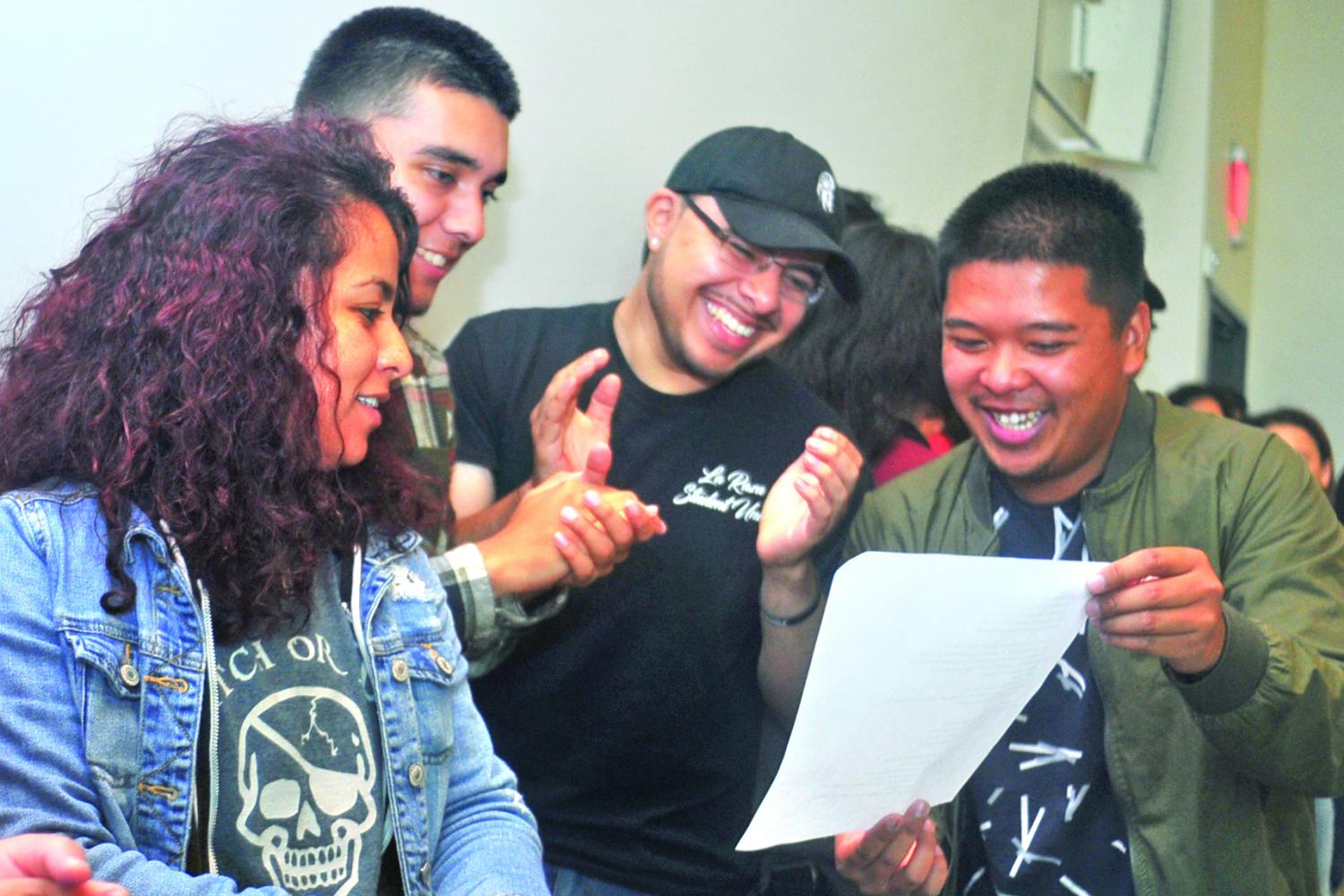DACA’s fate in limbo, college community extends its support
Gabriel Sanchez (middle right) and nursing major Joey Lumagbas (right) join La Raza Student Union and Puente Club members as they read lyrics for a song written by economics major Oscar Martinez during the Deferred Action for Childhood Arrivals, DACA, Info Night in the GE-225 on Friday.
Sep 15, 2017
La Raza Student Union President Ricardo Sanchez said he remembers the night he crossed the border as if it were yesterday.
Sanchez’s memory of meeting up in Tijuana with his coyote, the man who he was going to trust with his American dream, was the single most significant moment in his life up to that point.
“It’s so vivid in my memory, just walking in the desert at night. It was pitch black and you could see the lights across the border of Arizona. It was about a four hour walk.”
Sanchez said he came to the United States at the age of 10 in search of a better future,
He said during La Raza Student Union (LRSU) and the Puente Club’s student panel for the DACA Info Night event in GE-225 on Friday.
Sanchez is one of the 800,000 people who benefitted through Deferred Action for Childhood Arrivals (DACA), the Obama-era program that allowed undocumented immigrants to obtain a two-year renewable work permit and exemption from deportation.
The statute that offered a second chance to children who came to the United States for a better future was rescinded on Sept. 5 leaving many lives in jeopardy.
“I remember me and my brother wanted a burger from Jack in the Box and my dad sold his blood in order to buy us food,” Sanchez said.
Sanchez took a moment to catch his breath as his emotions came up and the crowd applauded in support.
Through DACA, Sanchez said he was able to earn gainful employment for the first time.
“That job allowed me to buy my first car, a TV for my dad, a laptop for my mom. It gave me so much joy. My family means everything to me.”
When Sanchez heard the news about DACA ending, he said he was more afraid of Immigration and Custom Enforcement (ICE) coming to his house and deporting his family.
“I did not feel sorry for myself because that is what my father taught me — not to feel sorry for myself. I was not afraid to be deported.”
The fear of separation is alive in the undocumented community as the 6-month deadline given by the president to Congress to figure out the fate of DACA creeps closer.
Trump said he will “revisit” the issue if Congress fails to come up with a proper plan, but it is not clear what those plans will be.
Dean of Equity and Institutional Effectiveness Mayra Padilla said she remembers the times before DACA existed.
“The pain is in our bellies — our hearts. And it is scary and it is a sad day when we have to talk to our students and our family members about having an exit plan. That’s our reality. We have to be prepared.”
Padilla said it is time to get politically involved and talk to congress or talk to representatives to hold them accountable for their actions.
“We have to mobilize our communities and really get involved. ”
Many who came to the U.S. at young age, now consider themselves as part of this country.
Sanchez said he was raised in Richmond and considers himself an American.
“My heart is in Mexico but my body and everything (is here). I am an American.”
“If I get fired, I can’t get welfare. I can’t receive the benefits that a citizen would get,” he said.
But as an undocumented immigrant, Sanchez said, he wants everyone to know how much undocumented immigrants sacrifice without receiving anything in return.
As part of DACA Info Night, two Bay Area immigration lawyers provided information regarding DACA and answered questions from the audience about deportation and other concerns.
The tension in the room settled as the lawyers reassured the attendees about rational fears and things that may be misinterpreted.
Certified Immigration Law Specialist Renzo Manay said there is a misconception that if DACA ends, everybody who benefitted from DACA will receive a letter saying they will be deported.
But according to White House Press Secretary Sean Spicer, the president prioritizes “criminals” and not DACA recipients.
As part of the necessary criteria to meet in order to potentially qualify for DACA, the applicant must have a clean slate prior to going through a biometrics screening for the United States Citizenship and Immigration Services (USCIS).
Certified Legal Specialist Renato F. Manay said DACA recipients are excluded from the “high priority” list of deportation.
“Fortunately, DACA recipients fall under low priority, which means they are the last ones who actually can get sent back,” (Renato) Manay said.
San Francisco State University student Manuel Martinez said it is not a political issue but a personal attack on the community as a whole.
Martinez said, “When you attack 800,000 DACA workers, classmates, students teachers, mothers, to me that doesn’t sound like a political issue, that is not economical, that is not a labor issue, to me that is a humanitarian issue and that is when things start getting serious.”
“I feel incredibly attacked.”
In an attempt to soothe freshly cut wounds, students from LRSU and Puente Club, led by economics major Oscar Martinez performed an original song about uplifting the undocumented community despite the demonization and discrimination they face on a daily basis.
“Dreamers, let’s gather around,” they sang in unity. “We ain’t gonna let nobody put us down. We gonna stand tall in unity. We are gonna stand strong against bigotry.”



